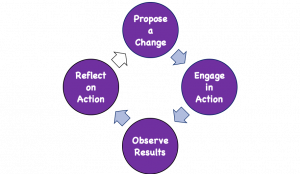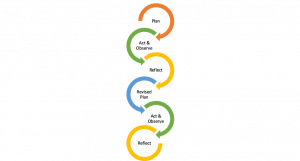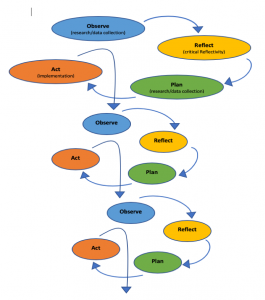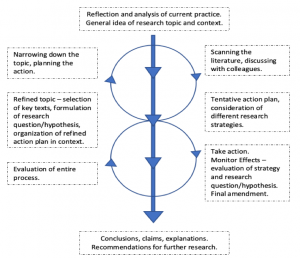
Educational research provides a vast landscape of knowledge on topics related to teaching and learning, curriculum and assessment, students’ cognitive and affective needs, cultural and socio-economic factors of schools, and many other factors considered viable to improving schools. Educational stakeholders rely on research to make informed decisions that ultimately affect the quality of schooling for their students. Accordingly, the purpose of educational research is to engage in disciplined inquiry to generate knowledge on topics significant to the students, teachers, administrators, schools, and other educational stakeholders. Just as the topics of educational research vary, so do the approaches to conducting educational research in the classroom. Your approach to research will be shaped by your context, your professional identity, and paradigm (set of beliefs and assumptions that guide your inquiry). These will all be key factors in how you generate knowledge related to your work as an educator.
Action research is an approach to educational research that is commonly used by educational practitioners and professionals to examine, and ultimately improve, their pedagogy and practice. In this way, action research represents an extension of the reflection and critical self-reflection that an educator employs on a daily basis in their classroom. When students are actively engaged in learning, the classroom can be dynamic and uncertain, demanding the constant attention of the educator. Considering these demands, educators are often only able to engage in reflection that is fleeting, and for the purpose of accommodation, modification, or formative assessment. Action research offers one path to more deliberate, substantial, and critical reflection that can be documented and analyzed to improve an educator’s practice.
Purpose of Action Research
As one of many approaches to educational research, it is important to distinguish the potential purposes of action research in the classroom. This book focuses on action research as a method to enable and support educators in pursuing effective pedagogical practices by transforming the quality of teaching decisions and actions, to subsequently enhance student engagement and learning. Being mindful of this purpose, the following aspects of action research are important to consider as you contemplate and engage with action research methodology in your classroom:
In thinking about the purpose of action research, it is helpful to situate action research as a distinct paradigm of educational research. I like to think about action research as part of the larger concept of living knowledge. Living knowledge has been characterized as “a quest for life, to understand life and to create… knowledge which is valid for the people with whom I work and for myself” (Swantz, in Reason & Bradbury, 2001, pg. 1). Why should educators care about living knowledge as part of educational research? As mentioned above, action research is meant “to produce practical knowledge that is useful to people in the everyday conduct of their lives and to see that action research is about working towards practical outcomes” (Koshy, 2010, pg. 2). However, it is also about:
creating new forms of understanding, since action without reflection and understanding is blind, just as theory without action is meaningless. The participatory nature of action research makes it only possible with, for and by persons and communities, ideally involving all stakeholders both in the questioning and sense making that informs the research, and in the action, which is its focus. (Reason & Bradbury, 2001, pg. 2)
In an effort to further situate action research as living knowledge, Jean McNiff reminds us that “there is no such ‘thing’ as ‘action research’” (2013, pg. 24). In other words, action research is not static or finished, it defines itself as it proceeds. McNiff’s reminder characterizes action research as action-oriented, and a process that individuals go through to make their learning public to explain how it informs their practice. Action research does not derive its meaning from an abstract idea, or a self-contained discovery – action research’s meaning stems from the way educators negotiate the problems and successes of living and working in the classroom, school, and community.
While we can debate the idea of action research, there are people who are action researchers, and they use the idea of action research to develop principles and theories to guide their practice. Action research, then, refers to an organization of principles that guide action researchers as they act on shared beliefs, commitments, and expectations in their inquiry.
Reflection and the Process of Action Research
When an individual engages in reflection on their actions or experiences, it is typically for the purpose of better understanding those experiences, or the consequences of those actions to improve related action and experiences in the future. Reflection in this way develops knowledge around these actions and experiences to help us better regulate those actions in the future. The reflective process generates new knowledge regularly for classroom teachers and informs their classroom actions.
Unfortunately, the knowledge generated by educators through the reflective process is not always prioritized among the other sources of knowledge educators are expected to utilize in the classroom. Educators are expected to draw upon formal types of knowledge, such as textbooks, content standards, teaching standards, district curriculum and behavioral programs, etc., to gain new knowledge and make decisions in the classroom. While these forms of knowledge are important, the reflective knowledge that educators generate through their pedagogy is the amalgamation of these types of knowledge enacted in the classroom. Therefore, reflective knowledge is uniquely developed based on the action and implementation of an educator’s pedagogy in the classroom. Action research offers a way to formalize the knowledge generated by educators so that it can be utilized and disseminated throughout the teaching profession.
Research is concerned with the generation of knowledge, and typically creating knowledge related to a concept, idea, phenomenon, or topic. Action research generates knowledge around inquiry in practical educational contexts. Action research allows educators to learn through their actions with the purpose of developing personally or professionally. Due to its participatory nature, the process of action research is also distinct in educational research. There are many models for how the action research process takes shape. I will share a few of those here. Each model utilizes the following processes to some extent:

Figure 1.1 Basic action research cycle
There are many other models that supplement the basic process of action research with other aspects of the research process to consider. For example, figure 1.2 illustrates a spiral model of action research proposed by Kemmis and McTaggart (2004). The spiral model emphasizes the cyclical process that moves beyond the initial plan for change. The spiral model also emphasizes revisiting the initial plan and revising based on the initial cycle of research:

Figure 1.2 Interpretation of action research spiral, Kemmis and McTaggart (2004, p. 595)
Other models of action research reorganize the process to emphasize the distinct ways knowledge takes shape in the reflection process. O’Leary’s (2004, p. 141) model, for example, recognizes that the research may take shape in the classroom as knowledge emerges from the teacher’s observations. O’Leary highlights the need for action research to be focused on situational understanding and implementation of action, initiated organically from real-time issues:

Figure 1.3 Interpretation of O’Leary’s cycles of research, O’Leary (2000, p. 141)
Lastly, Macintyre’s (2000, p. 1) model, offers a different characterization of the action research process. Macintyre emphasizes a messier process of research with the initial reflections and conclusions as the benchmarks for guiding the research process. Macintyre emphasizes the flexibility in planning, acting, and observing stages to allow the process to be naturalistic. Our interpretation of Macintyre process is below:

Figure 1.4 Interpretation of the action research cycle, Macintyre (2000, p. 1)
We believe it is important to prioritize the flexibility of the process, and encourage you to only use these models as basic guides for your process. Your process may look similar, or you may diverge from these models as you better understand your students, context, and data.
Definitions of Action Research and Examples
At this point, it may be helpful for readers to have a working definition of action research and some examples to illustrate the methodology in the classroom. Bassey (1998, p. 93) offers a very practical definition and describes “action research as an inquiry which is carried out in order to understand, to evaluate and then to change, in order to improve educational practice.” Cohen and Manion (1994, p. 192) situate action research differently, and describe action research as emergent, writing:
essentially an on-the-spot procedure designed to deal with a concrete problem located in an immediate situation. This means that ideally, the step-by-step process is constantly monitored over varying periods of time and by a variety of mechanisms (questionnaires, diaries, interviews and case studies, for example) so that the ensuing feedback may be translated into modifications, adjustment, directional changes, redefinitions, as necessary, so as to bring about lasting benefit to the ongoing process itself rather than to some future occasion.
Lastly, Koshy (2010, p. 9) describes action research as:
a constructive inquiry, during which the researcher constructs his or her knowledge of specific issues through planning, acting, evaluating, refining and learning from the experience. It is a continuous learning process in which the researcher learns and also shares the newly generated knowledge with those who may benefit from it.
These definitions highlight the distinct features of action research and emphasize the purposeful intent of action researchers to improve, refine, reform, and problem-solve issues in their educational context. To better understand the distinctness of action research, these are some examples of action research topics:
Examples of Action Research Topics
Action Research in Theory
Action research-based inquiry in educational contexts and classrooms involves distinct participants – students, teachers, and other educational stakeholders within the system. All of these participants are engaged in activities to benefit the students, and subsequently society as a whole. Action research contributes to these activities and potentially enhances the participants’ roles in the education system. Participants’ roles are enhanced based on two underlying principles:
In our quest for knowledge and understanding, we have consistently analyzed human experience over time and have distinguished between types of reality. Humans have constantly sought “facts” and “truth” about reality that can be empirically demonstrated or observed.
Social systems are based on beliefs, and generally, beliefs about what will benefit the greatest amount of people in that society. Beliefs, and more specifically the rationale or support for beliefs, are not always easy to demonstrate or observe as part of our reality. Take the example of an English Language Arts teacher who prioritizes argumentative writing in her class. She believes that argumentative writing demonstrates the mechanics of writing best among types of writing, while also providing students a skill they will need as citizens and professionals. While we can observe the students writing, and we can assess their ability to develop a written argument, it is difficult to observe the students’ understanding of argumentative writing and its purpose in their future. This relates to the teacher’s beliefs about argumentative writing; we cannot observe the real value of the teaching of argumentative writing. The teacher’s rationale and beliefs about teaching argumentative writing are bound to the social system and the skills their students will need to be active parts of that system. Therefore, our goal through action research is to demonstrate the best ways to teach argumentative writing to help all participants understand its value as part of a social system.
The knowledge that is conveyed in a classroom is bound to, and justified by, a social system. A postmodernist approach to understanding our world seeks knowledge within a social system, which is directly opposed to the empirical or positivist approach which demands evidence based on logic or science as rationale for beliefs. Action research does not rely on a positivist viewpoint to develop evidence and conclusions as part of the research process. Action research offers a postmodernist stance to epistemology (theory of knowledge) and supports developing questions and new inquiries during the research process. In this way action research is an emergent process that allows beliefs and decisions to be negotiated as reality and meaning are being constructed in the socially mediated space of the classroom.
Theorizing Action Research for the Classroom
All research, at its core, is for the purpose of generating new knowledge and contributing to the knowledge base of educational research. Action researchers in the classroom want to explore methods of improving their pedagogy and practice. The starting place of their inquiry stems from their pedagogy and practice, so by nature the knowledge created from their inquiry is often contextually specific to their classroom, school, or community. Therefore, we should examine the theoretical underpinnings of action research for the classroom. It is important to connect action research conceptually to experience; for example, Levin and Greenwood (2001, p. 105) make these connections:
Educators who engage in action research will generate new knowledge and beliefs based on their experiences in the classroom. Let us emphasize that these are all important to you and your work, as both an educator and researcher. It is these experiences, beliefs, and theories that are often discounted when more official forms of knowledge (e.g., textbooks, curriculum standards, districts standards) are prioritized. These beliefs and theories based on experiences should be valued and explored further, and this is one of the primary purposes of action research in the classroom. These beliefs and theories should be valued because they were meaningful aspects of knowledge constructed from teachers’ experiences. Developing meaning and knowledge in this way forms the basis of constructivist ideology, just as teachers often try to get their students to construct their own meanings and understandings when experiencing new ideas.
Classroom Teachers Constructing their Own Knowledge
Most of you are probably at least minimally familiar with constructivism, or the process of constructing knowledge. However, what is constructivism precisely, for the purposes of action research? Many scholars have theorized constructivism and have identified two key attributes (Koshy, 2010; von Glasersfeld, 1987):
Considering these two attributes, constructivism is distinct from conventional knowledge formation because people can develop a theory of knowledge that orders and organizes the world based on their experiences, instead of an objective or neutral reality. When individuals construct knowledge, there are interactions between an individual and their environment where communication, negotiation and meaning-making are collectively developing knowledge. For most educators, constructivism may be a natural inclination of their pedagogy. Action researchers have a similar relationship to constructivism because they are actively engaged in a process of constructing knowledge. However, their constructions may be more formal and based on the data they collect in the research process. Action researchers also are engaged in the meaning making process, making interpretations from their data. These aspects of the action research process situate them in the constructivist ideology. Just like constructivist educators, action researchers’ constructions of knowledge will be affected by their individual and professional ideas and values, as well as the ecological context in which they work (Biesta & Tedder, 2006). The relations between constructivist inquiry and action research is important, as Lincoln (2001, p. 130) states:
much of the epistemological, ontological, and axiological belief systems are the same or similar, and methodologically, constructivists and action researchers work in similar ways, relying on qualitative methods in face-to-face work, while buttressing information, data and background with quantitative method work when necessary or useful.
While there are many links between action research and educators in the classroom, constructivism offers the most familiar and practical threads to bind the beliefs of educators and action researchers.
Epistemology, Ontology, and Action Research
It is also important for educators to consider the philosophical stances related to action research to better situate it with their beliefs and reality. When researchers make decisions about the methodology they intend to use, they will consider their ontological and epistemological stances. It is vital that researchers clearly distinguish their philosophical stances and understand the implications of their stance in the research process, especially when collecting and analyzing their data. In what follows, we will discuss ontological and epistemological stances in relation to action research methodology.
Ontology, or the theory of being, is concerned with the claims or assumptions we make about ourselves within our social reality – what do we think exists, what does it look like, what entities are involved and how do these entities interact with each other (Blaikie, 2007). In relation to the discussion of constructivism, generally action researchers would consider their educational reality as socially constructed. Social construction of reality happens when individuals interact in a social system. Meaningful construction of concepts and representations of reality develop through an individual’s interpretations of others’ actions. These interpretations become agreed upon by members of a social system and become part of social fabric, reproduced as knowledge and beliefs to develop assumptions about reality. Researchers develop meaningful constructions based on their experiences and through communication. Educators as action researchers will be examining the socially constructed reality of schools. In the United States, many of our concepts, knowledge, and beliefs about schooling have been socially constructed over the last hundred years. For example, a group of teachers may look at why fewer female students enroll in upper-level science courses at their school. This question deals directly with the social construction of gender and specifically what careers females have been conditioned to pursue. We know this is a social construction in some school social systems because in other parts of the world, or even the United States, there are schools that have more females enrolled in upper level science courses than male students. Therefore, the educators conducting the research have to recognize the socially constructed reality of their school and consider this reality throughout the research process. Action researchers will use methods of data collection that support their ontological stance and clarify their theoretical stance throughout the research process.
Koshy (2010, p. 23-24) offers another example of addressing the ontological challenges in the classroom:
A teacher who was concerned with increasing her pupils’ motivation and enthusiasm for learning decided to introduce learning diaries which the children could take home. They were invited to record their reactions to the day’s lessons and what they had learnt. The teacher reported in her field diary that the learning diaries stimulated the children’s interest in her lessons, increased their capacity to learn, and generally improved their level of participation in lessons. The challenge for the teacher here is in the analysis and interpretation of the multiplicity of factors accompanying the use of diaries. The diaries were taken home so the entries may have been influenced by discussions with parents. Another possibility is that children felt the need to please their teacher. Another possible influence was that their increased motivation was as a result of the difference in style of teaching which included more discussions in the classroom based on the entries in the dairies.
Here you can see the challenge for the action researcher is working in a social context with multiple factors, values, and experiences that were outside of the teacher’s control. The teacher was only responsible for introducing the diaries as a new style of learning. The students’ engagement and interactions with this new style of learning were all based upon their socially constructed notions of learning inside and outside of the classroom. A researcher with a positivist ontological stance would not consider these factors, and instead might simply conclude that the dairies increased motivation and interest in the topic, as a result of introducing the diaries as a learning strategy.
Epistemology, or the theory of knowledge, signifies a philosophical view of what counts as knowledge – it justifies what is possible to be known and what criteria distinguishes knowledge from beliefs (Blaikie, 1993). Positivist researchers, for example, consider knowledge to be certain and discovered through scientific processes. Action researchers collect data that is more subjective and examine personal experience, insights, and beliefs.
Action researchers utilize interpretation as a means for knowledge creation. Action researchers have many epistemologies to choose from as means of situating the types of knowledge they will generate by interpreting the data from their research. For example, Koro-Ljungberg et al., (2009) identified several common epistemologies in their article that examined epistemological awareness in qualitative educational research, such as: objectivism, subjectivism, constructionism, contextualism, social epistemology, feminist epistemology, idealism, naturalized epistemology, externalism, relativism, skepticism, and pluralism. All of these epistemological stances have implications for the research process, especially data collection and analysis. Please see the table on pages 689-90, linked below for a sketch of these potential implications:
Again, Koshy (2010, p. 24) provides an excellent example to illustrate the epistemological challenges within action research:
A teacher of 11-year-old children decided to carry out an action research project which involved a change in style in teaching mathematics. Instead of giving children mathematical tasks displaying the subject as abstract principles, she made links with other subjects which she believed would encourage children to see mathematics as a discipline that could improve their understanding of the environment and historic events. At the conclusion of the project, the teacher reported that applicable mathematics generated greater enthusiasm and understanding of the subject.
The educator/researcher engaged in action research-based inquiry to improve an aspect of her pedagogy. She generated knowledge that indicated she had improved her students’ understanding of mathematics by integrating it with other subjects – specifically in the social and ecological context of her classroom, school, and community. She valued constructivism and students generating their own understanding of mathematics based on related topics in other subjects. Action researchers working in a social context do not generate certain knowledge, but knowledge that emerges and can be observed and researched again, building upon their knowledge each time.
Researcher Positionality in Action Research
In this first chapter, we have discussed a lot about the role of experiences in sparking the research process in the classroom. Your experiences as an educator will shape how you approach action research in your classroom. Your experiences as a person in general will also shape how you create knowledge from your research process. In particular, your experiences will shape how you make meaning from your findings. It is important to be clear about your experiences when developing your methodology too. This is referred to as researcher positionality. Maher and Tetreault (1993, p. 118) define positionality as:
Gender, race, class, and other aspects of our identities are markers of relational positions rather than essential qualities. Knowledge is valid when it includes an acknowledgment of the knower’s specific position in any context, because changing contextual and relational factors are crucial for defining identities and our knowledge in any given situation.
By presenting your positionality in the research process, you are signifying the type of socially constructed, and other types of, knowledge you will be using to make sense of the data. As Maher and Tetreault explain, this increases the trustworthiness of your conclusions about the data. This would not be possible with a positivist ontology. We will discuss positionality more in chapter 6, but we wanted to connect it to the overall theoretical underpinnings of action research.
Advantages of Engaging in Action Research in the Classroom
In the following chapters, we will discuss how action research takes shape in your classroom, and we wanted to briefly summarize the key advantages to action research methodology over other types of research methodology. As Koshy (2010, p. 25) notes, action research provides useful methodology for school and classroom research because:
Advantages of Action Research for the Classroom